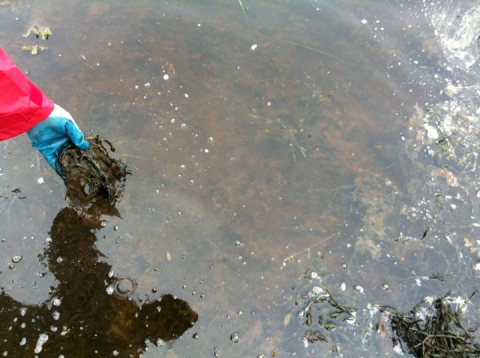You are here
Province failing to enforce fish farm rules

Sheet Harbour: In late 2012, the Association for the Preservation of the Eastern Shore asked for, and obtained, environmental monitoring data for the Owl's Head salmon farm from the Nova Scotia Department of Fisheries and Aquaculture. The Owl's Head lease is owned by a subsidiary of the Scottish company, Loch Duart.
According to the data they received, the Owl’s Head salmon farm exceeded provincial monitoring guidelines in 2009 and 2010. Sulphide levels in the sediments were more than four times above provincial guidelines. The farm was fallowed for two years and restocked in 2012.
Bill Williams, a member of the Eastern Shore Association, said the problem with the fish farm starting- up is that the monitoring stations around the fish farm with the highest impacts in 2009 were not re-tested in 2012 and the new environmental monitoring sites don’t follow the province’s rules for monitoring.
“They might as well have thrown darts at a map to pick their monitoring stations,” said Williams. “It’s hardly scientific and it sure doesn’t meet the standard set out by the province”.
Williams said that in 2011, the NS Department of Fisheries and Aquaculture released new standard operating procedures (SOP) for the environmental monitoring of aquaculture sites in 2011. The SOP states that “sampling stations will be evenly spaced on either side of centre along the longitudinal axis beginning with a station at either end of the axis”. William wants to know why the province isn’t enforcing their own rules.
“How will the province know when there is an impact from the farm if they are not sampling in the right place? I asked Minister Belliveau the same question in December and I haven’t got an explanation yet” says Williams.
Inka Milewski, a marine biologist and science advisor with the Conservation Council of New Brunswick, who analyzed the data for the Association said that it was a mistake for provincial regulators to think that the biological impacts of high sulphide from fish farms can be easily reversed. “My research in New Brunswick and Nova Scotia indicates that the toxic effects can last years. The water depth and currents in the bays and estuaries of Nova Scotia are just too shallow and too weak to accommodate the massive amount of waste produced in open net pen salmon farms. The solution is to move these operations onto land”.
What the Press is saying:
Chronicle Herald Fish farm tests found wanting.pdf
Letter to Belliveau
Bill Williams of APES wrote a letter to Sterling Belliveau, Minister of Environment, Fisheries and Aquaculture on the issue that the province is failing to enforce their own fish farm rules.
Copyright APES 2012 Website by Ionsign Online

